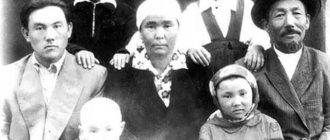Veronica Skvortsova, whose biography deserves respect and admiration, has a happy personal life with her husband, as evidenced by photos that can be found on the Internet. She managed to achieve success in her career on her own. This makes her admired by many. From an early age she showed ability in the study of medicine. This is not surprising, because Skvortsova is a hereditary doctor. She managed to achieve success in the development of Russian medicine.
https://youtu.be/https://www.youtube.com/watch?v=qJ9BLGqOD_g
_
Childhood and family
The future medical official was born in Moscow on November 1, 1960 in a family of hereditary doctors. Her great-great-grandfather taught at the St. Petersburg Medical Academy, her great-grandmother was a graduate of women's medical courses, which were later transformed into a university, which became the basis for the creation of the Second Moscow Order of Lenin State Medical Institute (MOLGMI). My father was a teacher at this educational institution with the rank of professor in the department of nervous diseases.
Veronica Skvortsova's parents were doctors
After a special school with a mathematical focus, graduating with a gold medal in 1977, Veronica became a student at this particular university. Although, it should be admitted that, in addition to medicine, she always also liked classical music, especially Rachmaninov, so the girl professionally studied piano.
However, among her priorities, medicine was still in first place. According to the current member of the government, there were 4 generations of doctors in their family, and she was about to become the fifth. Since her youth, she was very fascinated by questions of the structure of the brain. She was already interested in the discoveries of scientists regarding the interaction between its individual areas, and became acquainted with the monographs of the neurosurgeon Wilder G. Penfield that appeared in those years on the structural and functional organization of the cerebral cortex. She decided to devote her life to these issues.
Persons directory
Mention in materials:
- January 15, 14:15
Skvortsova is waiting for a bill on the age of sale of strong alcohol to be submitted to the State Duma - December 25, 2020, 19:19
The government argued in absentia about the quality of implementation of the healthcare optimization program - December 4, 2020, 11:25 pm
The head of the Ministry of Health gave up fitness after 1.5 months of classes - November 28, 2020, 12:02 pm
“Our children will simply die.” Parents ask for the return of original drugs to patients with cystic fibrosis - November 26, 2020, 16:09
Skvortsova returned dismissed transplantologists Kaabak and Babenko to the National Medical Research Center for Children's Health - November 20, 2020, 19:50
Skvortsova promises to help children in need of kidney transplants - November 2, 2020, 14:51
The Ministry of Health has changed the daily salt intake - October 28, 2020, 15:21
The Kremlin commented on the idea of a referendum on euthanasia in Russia - September 22, 2020, 18:02
Patients in Russia can start receiving medications prescribed by doctors for free or at a discount - September 22, 2020, 15:21
The Ministry of Health proposed to provide medications for free
Born in Moscow.
In 1983, she graduated from the 2nd Moscow Order of Lenin State Medical Institute named after. N.I. Pirogov (2nd MOLGMI).
Then clinical residency at the institute and full-time postgraduate study in the specialty “Nervous diseases”. In 1994, she was awarded the qualification of a neurologist of the highest category.
After graduation, she remained at the 2nd Moscow State Medical Institute (since 1991 - Russian State Medical University, RGMU), where she worked for twenty-five years.
In 1989, she headed the neuroreanimation service of the 1st City Hospital of Moscow, organized on the basis of the neurological clinic of the 2nd Moscow Regional Medical Institute.
In 1989 - 1995 - worked as an assistant, in 1995 - 1997. - Associate Professor of the Department of Nervous Diseases of the Russian State Medical University.
Since 1997 - headed the department of fundamental and clinical neurology and neurosurgery.
Since 2005, she has been the director of the Stroke Research Institute of the Russian State Medical University.
In 2008 - 2012 — was Deputy Minister of Health and Social Development of the Russian Federation.
May 21, 2012 - appointed Minister of Health of the Russian Federation.
On May 18, 2020, she was reappointed as Minister of Health of the Russian Federation.
He is vice president and initiator of the creation of the National Stroke Association, director of the World Stroke Federation, and secretary general of the European Stroke Council.
Doctor of Medical Sciences, Professor, Corresponding Member of the Russian Academy of Medical Sciences.
Honored Scientist of the Russian Federation.
Awarded the Order of Honor. Winner of the award named after. N.I. Pirogov Russian State Medical University and the Moscow Government Prize in the field of medicine.
Author of more than 400 scientific papers, holder of seven patents for inventions.
Medical career
Skvortsova graduated from her second medical school in 1983 with honors, as well as from school. While still a student, she was engaged in scientific work at her father’s department and published the results of her research. She remained to work there after completing residency and graduate school, and in 1988 she became a candidate of science.
Veronica Skvortsova's family helped her in her career
While working as an assistant, in 1993 she defended her doctoral dissertation and became, according to media reports, the youngest woman in the world with a higher academic degree.
In parallel with her main work at the institute, she was engaged in the management of the neuroresuscitation service in the capital’s clinic. At the age of 35, Veronica was already teaching with the rank of associate professor, at the age of 37 she became the head of the department, and at 39 - a professor.
Such a meteoric rise in career was often criticized by less successful colleagues, who rightly doubted the feasibility of its implementation without outside support.
Instagram and Wikipedia Veronica Skvortsova
Veronica Igorevna is very busy on all fronts of her work activity, so she does not have accounts on social networks and Instagram. Veronica Skvortsova's Wikipedia fully reveals the woman's scientific achievements as the author of medical works, has links to texts, and there you can also read the chronology of the politician's biography. In 2008, the scientist was awarded the Order of Honor - the highest state award of the Russian Federation. The minister is also a laureate of a prize in the field of medicine and his institute.
Political career
In 1999, Veronika Skvortsova became one of the authors of the idea of organizing a stroke association, which was declared a global epidemic by WHO.
In 2004, she was elected a corresponding member of the Academy of Sciences, and in 2005 she headed a specialized research institute, where a program was developed, implemented in a number of areas, to combat vascular diseases, which account for more than half of the deaths on the planet. During anti-stroke measures, brain studies using tomography were recommended and carried out on a large scale. However, ill-wishers noted that these actions were accompanied by an unprecedented theft of funds allocated by the state for the purchase of expensive equipment.
Interview with Veronika Skvortsova Minister of Health In 2008, Mrs. Skvortsova received the position of Deputy Minister of Health and Social Development, although she noted in an interview that she never dreamed that her immediate boss might one day become not the chief physician, but the president of the country. While in office, she oversaw the development of legislative acts in the field of health care, showed dedication in providing assistance to victims of the Georgian-Ossetian conflict, receiving the Order of Honor as a reward for this.
In 2011, the deputy minister noted that the introduction of new forms of combating cardiovascular diseases in the Russian Federation had reduced the mortality rate from stroke from 80 percent (when four out of five patients died) to 20.
Veronika Skvortsova: mortality from strokes decreased by 2 times After the reorganization of the Ministry of Health and Social Development (division into the Ministry of Health and the Ministry of Labor) in 2012, she headed the Ministry of Health, finally changing her job as a doctor to the position of an official. The minister and a recognized authority in the medical community believes that the accumulated problems in the field of health care in Russia can be solved through consistent actions.
Since her appointment, the government has been carrying out health care reforms, an anti-tobacco law was approved, amendments to legislation are planned regarding medical examinations, motivation for sports, and a healthy lifestyle. She also supported the initiative to update the curricula of medical school students and recertify their teaching staff.
Minister of Health Veronika Skvortsova
The head of the Ministry of Health is the author of more than four hundred scientific research, the holder of seven patents, holds the post of editor-in-chief of the Russian version of the journal Stroke (Stroke), and a scientific consultant for the oldest domestic medical publication, the S.S. Korsakov Journal of Neurology and Psychiatry.
What will 8-year-old Veronica Skvortsova remember in Russian healthcare?
Let us remember that in 2020, in an interview with the television program “Alone with Everyone,” Veronika Skvortsova said that she never dreamed of becoming the Minister of Health - she “couldn’t even dream of this in her worst nightmare.” And when she was finally appointed in May 2012, the family took it difficult - “the attitude towards officials was peculiar.”
Medical Minister
Veronika Skvortsova, even on her way to international meetings and symposiums, more than once became a newsmaker, saving passengers. So, in September 2020, while going to New York for the UN General Assembly, the minister provided medical assistance to one of the plane passengers - the woman suffered a transient ischemic attack. For this act, the head of the Ministry of Health received gratitude from the Russian government and the Shield and Rose 2017 award. In March last year, the minister helped a passenger on the Moscow-Tashkent flight, a woman who had a stomach ache, using pills from the minister’s first aid kit.
“Correct speech production”
Over the years of work as a minister, Veronika Skvortsova has honed her skill in publicly responding to criticism. So, if at SPIEF in 2018 Nyuta Federmesser, who called the statistics from the Ministry of Health a lie, said: “correct your speech production,” then Tatyana Golikova’s criticism that the optimization was carried out terribly was already called overly emotional: “Probably It may be too emotional to say that something was done horribly there, and obviously one cannot agree that accessibility and quality have decreased as a result. This is not the case, otherwise we would not have achieved an increase in life expectancy of more than five years.”
The Ministry of Health has increased life expectancy, and with it the retirement age
Indeed, life expectancy under Skvortsova grew by leaps and bounds. With Russia again approaching a unique phenomenon called the “Russian cross” in the 1990s (mortality exceeding birth rate), life expectancy on paper has increased so much that it has allowed the government to raise the retirement age. The minister had to fulfill the promise made back in 2013: “The population of Russia in 2013 can become positive for the first time, this will happen not due to an increase in the birth rate, but due to a decrease in mortality.”
We didn’t get a positive result, but the retirement age had to be increased. Therefore, Veronika Igorevna convinced that raising the retirement age would allow Russians to “stay in service longer” and maintain active longevity. And that “according to the most conservative estimates, a person can live for at least 120 years.”
During Alexander Beglov’s election campaign last summer, Veronika Skvortsova was in his support group and complimented the St. Petersburg healthcare system: “St. Petersburg today is ahead of all of Russia. So, over the past year, life expectancy in the city has increased by six months, and now stands at 76 years, which is 3 years higher than the Russian average. The mortality rate has decreased; it is also lower than the Russian average.” Although in fact, St. Petersburg remains in the middle of the list of subjects of the Russian Federation in terms of mortality rates.
Unfulfilled priorities
Clinical examination was invented by Tatyana Golikova’s ministry, but Skvortsova’s ministry had to implement this idea. The lion's share of examinations is still carried out for show, despite this, planned tasks for medical examinations are growing.
In 2020, Veronika Skvortsova named 5 priorities in healthcare for the next 2-3 years, the development of which, according to the department, should seriously affect the quality and accessibility of medical care for Russians. But by 2020 they remained unfulfilled, or even failed.
- Reducing maternal and infant mortality
- Increasing access to medical care for residents of remote areas
- Eliminating the shortage of local doctors and improving the quality of medical training
- Development of digital technologies
- Increasing control over government procurement of medicines
Didn't smoke enough and didn't drink enough
As an inheritance from the Ministry of Health and Social Development Tatyana Golikova, the Ministry of Health Skvortsova inherited the responsibility of caring for drunken Russians. And over the course of all these years, we never managed to fight it off. It is still unclear why hospitals should function as overnight shelters for people who have had too much alcohol and are often aggressive while intoxicated. It’s good that the Ministry of Health did not agree to the creation of specialized sobering stations.
One of the main tasks of the Ministry of Health, headed by Veronica Skvortsova, was the fight against smoking and drinking alcohol. Prohibition, of course, was not introduced, but attempts were made to ban the sale of strong alcohol to young people under 21 - so far unsuccessful.
The anti-tobacco law, which seriously limited smoking areas in Russia, was adopted in 2013, but now it is slowly losing ground. Let us remember that smoking was recently allowed again at airports, which ministerial officials fought hard against. And the long-suffering “Anti-Tobacco Concept,” which the Ministry of Health has been working on since 2020, was repeatedly sent to the top for revision - various shortcomings were found there. The ministry’s ideas were global. For example, the department planned to reduce the prevalence of tobacco smoking to 5% by 2050, and then generally consider the issue of removing cigarettes from legal circulation in the country.
There are no complaints about the presentation of Russian healthcare at the international level
At the international level, Veronica Skvortsova has continuously created an ideal image of the domestic healthcare system. She was the President of the 70th WHO Assembly, and in 2020, along with 14 representatives of other countries, she joined the WHO Council for Monitoring Global Emergency Preparedness. She was appointed co-chair of the WHO commission on combating mortality from non-communicable diseases
However, Russia did not lag behind developed countries in the fight against infections. Let us recall that Russian laboratories operated in countries affected by the Ebola virus; specialists provided humanitarian medical assistance there; Russia also participated in the development of the Ebola vaccine (as the media reported, the cost of one dose of the domestic vaccine was 12-14 thousand rubles).
Taking into account international experience, Prime Minister Dmitry Medvedev appointed Veronika Skvortsova as chairman of the Russian side of the Intergovernmental Russian-Nicaraguan Commission on Trade, Economic, Scientific and Technical Cooperation. Previously, he appointed her chairman of the Russian-Swedish Supervisory Committee on Trade and Economic Cooperation for the Russian part. And it is not yet clear whether Veronica Skvortsova will retain these positions.
© Dr. Peter
Personal life of Veronica Skvortsova
Veronika Skvortsova is married to Givi Nadareishvili, an associate professor at the University of Mechanical Engineering.
He is also the general director of the Scientific and Technical Center for the Modernization of Serial Production and the founder of a number of companies in various fields of activity (production of auto parts, scientific and technical research, construction and architecture, consulting, real estate rental). The couple has a son, Georgy, who continued the dynasty - he graduated from school with honors and the Second Medical University, transformed into the Russian State Medical University in 1991, and works as a neurologist.
The first lady of the national healthcare system is usually so impeccably polite that some are beginning to suspect her of insincerity. She gained experience working with people back in her student years, when she was secretary of the faculty’s Komsomol organization, and knows how to insist on her decision without provoking confrontations and conflicts.
To Posner’s question about when she lies, Ms. Skvortsova replied that she never. She values kindness most of all in people, loves listening to music, communicating with her grandson and walking the dog.
Personal life
Veronika Igorevna Skvortsova is married to Givi Nadareishvili. In their marriage they had one son, George. Veronika Skvortsova met her husband during her student years. In their senior year, in 1983, they officially got married. Givi Nadareishvili holds the position of General Director of the Scientific and Technical Center for the Modernization of Serial Production, and is an associate professor at the University of Mechanical Engineering. Georgy followed in his mother’s footsteps and graduated from the Russian National Research Medical University. N.I. Pirogov. Today the heir works as an assistant at the department of neurology and neurosurgery.
Minister of Health
Veronika Skvortsova now
Veronika Skvortsova was not included in the new Government formed in January 2020 after the voluntary resignation of Dmitry Medvedev and his subordinates. The new Minister of Health is Mikhail Murashko, head of Roszdravnazdor. Probably, the loss of Skvortsova’s position is due to the recognition at the highest levels of government of the failure to optimize healthcare in the regions. “Hospitals and clinics are in terrible condition,” says Anton Siluanov. Skvortsova herself admitted that no one has systematically touched the medical infrastructure since the 50s.
Veronica Skvortsova's husband - Givi Nadareishvili
Veronica Skvortsova has been in a happy marriage for many years, her husband is her friend, support and support. The minister’s family life is protected from prying eyes in every possible way, since the politician believes that the main topics for discussion should be the country’s pressing problems, and not her biography and personal life. Veronica Skvortsova’s husband is Givi Nadareishvili, an associate professor at one of the departments of the Moscow Polytechnic University. Many photos of the minister can be seen on the Internet, but there are practically no photographs of her family.










